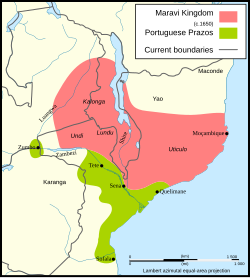
Back Maravi Afrikaans Reinos Maravi AST Regne de Maravi Catalan Maravi Welsh Maravi German Reinos Maravi Spanish Maravi Finnish Maravi French Regno di Maravi Italian マラビ Japanese
Kingdom of Maravi malaŵí (Spanish) | |||||||||||
|---|---|---|---|---|---|---|---|---|---|---|---|
| c. 1480–1891 | |||||||||||
 The Maravi Kingdom at its greatest extent in the 17th century. | |||||||||||
| Capital | Manthimba, Mankhamba | ||||||||||
| Common languages | |||||||||||
| Government | Monarchy | ||||||||||
| History | |||||||||||
• Established | c. 1480 | ||||||||||
• Disestablished | 1891 | ||||||||||
| |||||||||||
| Today part of | |||||||||||
Maravi was a kingdom which straddled the current borders of Malawi, Mozambique, and Zambia, in the 16th century. The present-day name "Maláŵi" is said to derive from the Chewa word malaŵí, which means "flames". "Maravi" is a general name of the peoples of Malawi, eastern Zambia, and northeastern Mozambique. The Chewa language, which is also referred to as Nyanja, Chinyanja or Chichewa, and is spoken in southern and central Malawi, in Zambia and to some extent in Mozambique, is the main language that emerged from this empire.
The Maravi Confederacy was founded by Bantu people immigrating into the valley of the Shire River (flowing out of Lake Nyassa) around 1480 AD. It prospered into the late 18th century, extending to reach what is now belonging to Zambia and Mozambique.
At its greatest extent, the state included territory from the Tonga and Tumbuka people's areas in the north to the Lower Shire in the south, and as far west as the Luangwa and Zambezi river valleys. Maravi's rulers belonged to the Mwale matriclan and held the title Kalonga. They ruled from Manthimba, the secular/administrative capital, and were the driving force behind the state's establishment. Meanwhile, the patrilineal Banda clan, which traditionally provided healers, sages and metallurgists, took care of religious affairs from their capital Mankhamba near Ntakataka.
© MMXXIII Rich X Search. We shall prevail. All rights reserved. Rich X Search